Remote, land-based gaming sectors in Malta at medium money laundering risk level
The use of virtual financial assets, cash and prepaid cards as payment methods in online and land-based gaming form part of the money laundering threat in Malta, according to Malta’s 2023 National Risk Assessment, published recently

The use of virtual financial assets, cash and prepaid cards as payment methods in online and land-based gaming form part of the money laundering threat in Malta, according to Malta’s 2023 National Risk Assessment (NRA), published recently.
The NRA accounts for the levels of money laundering and terrorist financing risk in Malta throughout 2023. It was created in conjunction with the National Coordinating Committee on Combatting Money Laundering and Funding of Terrorism (NCC), as well as government authorities.
The NRA classifies threats with a three-pronged system – impact, likelihood and threat level. It states that the use of virtual financial assets, cash and prepaid cards as payment methods form part of the money laundering threat in Malta.
In terms of the overall residual risks for money laundering in remote gaming and land-based gaming, the NRA defines these as ‘medium’. However, for both, the effectiveness of mitigating measures is ‘high’.
Customer-related vulnerabilities are also of high concern for the remote gaming industry in Malta, according to the NRA. This relates to customers who have a higher level of money laundering or terrorist financing risk.
The report classifies customer-related vulnerabilities as having the highest ratings possible across the board – ‘severe’ impact, ‘very high’ exposure and a ‘high’ vulnerability level for remote gaming.
For remote gaming, the impact of licensed operators being controlled by criminals is classed as ‘severe’. While the likelihood is graded as ‘possible’, the threat level is ranked as ‘medium-high’.
Looking at land-based gaming, the report outlines that a large part of its money laundering threat is the use of cash.
It states that the impact of laundering criminal proceeds through cash payment methods is ‘significant’, with the likelihood of occurrence ‘likely’ at a ‘medium-high’ threat level.
The risk for land-based bingo halls and national lotteries is ranked as ‘low’.
Recommendations for AML
To mitigate money laundering, the NRA report outlines recommendations for each sector.
For remote gaming and land-based gaming, the NRA recommends that they augment their risk-based approach.
This involves updating customer risk profiles periodically. Both sectors should also continue to maintain risk-based customer due diligence procedures.
Both should also monitor their transaction monitoring systems to detect any emerging risks.
The report’s publication comes after a busy period for the Malta Gaming Authority (MGA). Last week, the regulator cancelled its fifth licence this month, and the third this week. The affected operators are Super7Plus, Winners Malta Operations, Genesis Global, Rush Gaming and Betago Limited.
Other sectors
The NRA provides a comprehensive assessment of the country’s exposure to threats and vulnerabilities stemming from money laundering, terrorist financing, proliferation financing and targeted financial sanction risks.
Malta’s overall money laundering residual risk has decreased when compared to the 2018 NRA, reflecting the effectiveness of mitigating measures implemented by authorities and the private sector.
Notable improvements were registered across a number of sectors, including legal persons, trust and company service providers, banking, investment services, accountants and auditors, gaming, and virtual financial assets service providers.
Other sectors, in particular financial institutions, real estate agents, and dealers in high-value goods, also registered lower levels of risk. Nevertheless, compared to others, these sectors are susceptible to a higher risk of money laundering.






